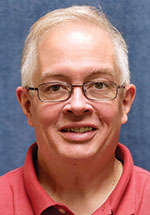Reflection / Sean Gallagher
Agonized racer shows wisdom beyond his years in the Indy 500
 At the end of the 108th running of the Indianapolis 500 on May 26, racer Pato O’Ward sat dejected for a long time in his race car, his head lowered. After finally climbing out of his car and taking off his helmet, O’Ward poured a bottle of water over his head in physical relief after driving hard for 500 miles.
At the end of the 108th running of the Indianapolis 500 on May 26, racer Pato O’Ward sat dejected for a long time in his race car, his head lowered. After finally climbing out of his car and taking off his helmet, O’Ward poured a bottle of water over his head in physical relief after driving hard for 500 miles.
He would much rather have had it been the victor’s bottle of milk in his hand.
But for the third year in a row, O’Ward saw victory before him—only for it to fall out of his grasp at the end of the race.
In 2022, he raced side by side with the winner going into the final lap, but wasn’t able to complete the pass. Last year, with eight laps to go and leading, O’Ward was passed on a restart and crashed in turn 3 while making a hard charge to get back to the front.
This year, O’Ward passed leader Josef Newgarden going into the last lap. Racing down the back stretch, O’Ward swerved up and down, doing all he could to hold off Newgarden, but to no avail. The winner of last year’s race took back the lead for good in turn 3.
An agonized O’Ward told an interviewer after the race, “It’s just so painful when you put so much into it and then [end up] two corners short.”
The interviewer then asked, “It’s this place, isn’t it?” acknowledging the challenge of winning at autosport’s most revered racecourse. O’Ward agreed, adding, “It owes me nothing.”
In saying this, the 25-year-old Mexican driver showed wisdom beyond his years. Many young people (and older people, for that matter) filled with talent too often think they’re entitled to end up on top.
Each of us yearns deeply in our hearts for an ultimate, never-ending victory in this life, whatever it might be.
Some people, like Newgarden, get a taste of it. Others, as O’Ward painfully knows, do not. In any case, it’s not promised to anyone, and even the fleeting triumphs we experience in this life are only a shadow of the eternal victory that is promised for us in heaven.
The Letter the Hebrews calls us to live in the reality that, in this life, “we have no lasting city,” and instead encourages us to “seek the one that is to come” in heaven (Heb 13:14).
At only 25, O’Ward may yet hoist the Borg Warner Trophy in Victory Lane after winning a future Indy 500. But, again showing some wisdom, he’s not taking that for granted.
“It’s always a heartbreak when you’re so close and especially when it’s not the first time. You just don’t know how many opportunities you’ll have,” he told the interviewer.
Whatever the future has in store for O’Ward, he found some consolation in the adulation of the 350,000 fans who filled the Indianapolis Motor Speedway on Sunday.
O’Ward said he could hear them cheering for him over the roar of his car’s engine as he took the lead at the start of the last lap.
“I love them. They’ve really made Indianapolis a home for me.”
Indianapolis is certainly not the eternal city that is to come. But O’Ward caught a glimpse of it in the support of thousands of race fans at the Speedway.
Whatever victories or defeats we experience in this life—and probably it’ll be a mixture of both—let us keep our eyes focused steadfastly on the never-ending triumph of sharing God’s eternal life and love in heaven.
And let’s be filled with hope. For, with God’s ever-present grace and mercy, we have been given everything we need for a victory that infinitely transcends drinking milk after winning the Indy 500.
(Sean Gallagher is a reporter for The Criterion.) †
 At the end of the 108th running of the Indianapolis 500 on May 26, racer Pato O’Ward sat dejected for a long time in his race car, his head lowered. After finally climbing out of his car and taking off his helmet, O’Ward poured a bottle of water over his head in physical relief after driving hard for 500 miles.
At the end of the 108th running of the Indianapolis 500 on May 26, racer Pato O’Ward sat dejected for a long time in his race car, his head lowered. After finally climbing out of his car and taking off his helmet, O’Ward poured a bottle of water over his head in physical relief after driving hard for 500 miles.